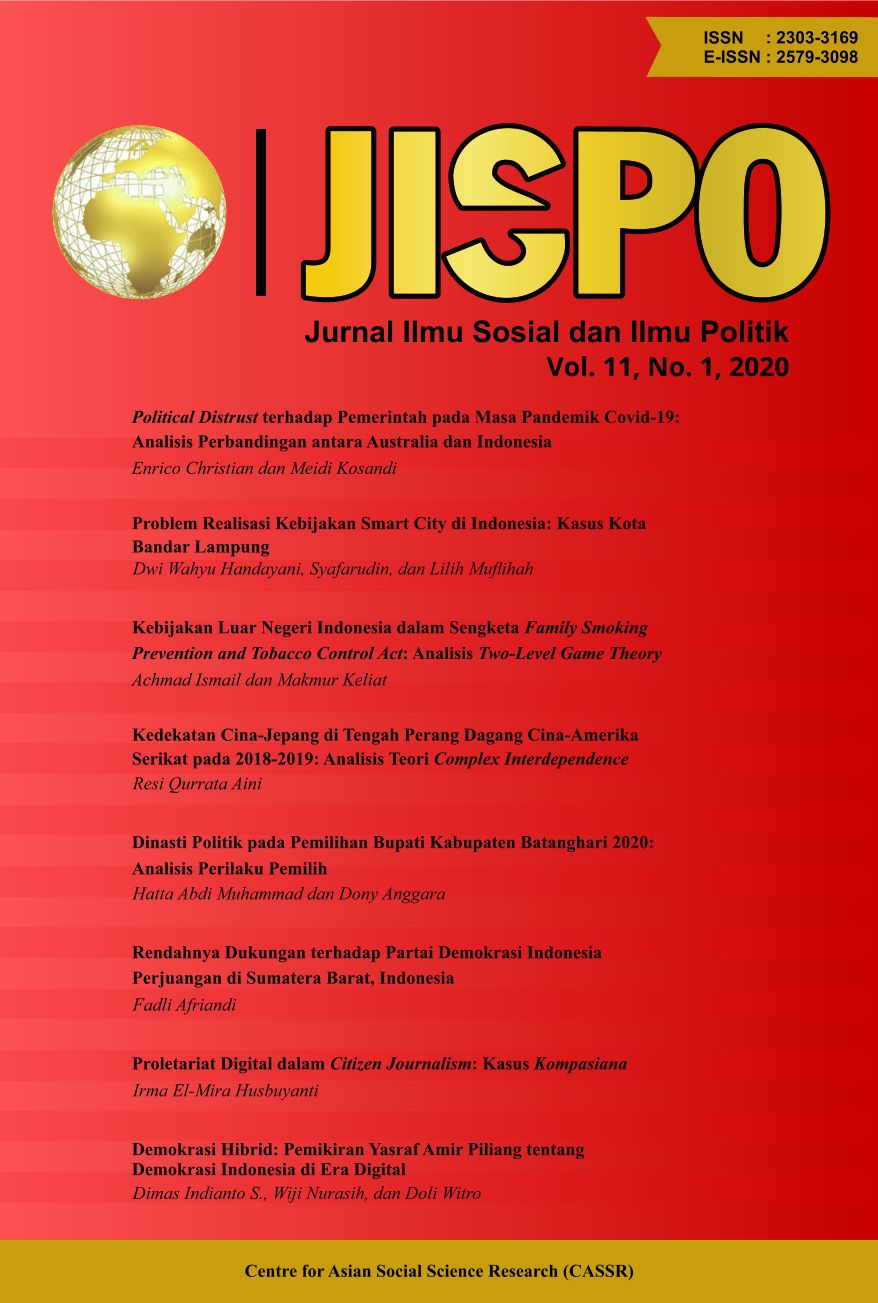Demokrasi Hibrid: Pemikiran Yasraf Amir Piliang tentang Demokrasi Indonesia di Era Digital
DOI:
https://doi.org/10.15575/jispo.v11i1.12253Keywords:
Hybrid democracy, digital era, Yasraf Amir Piliang, IndonesiaAbstract
Although it has been implemented for more than two decades since Reformasi 1998, democracy in Indonesia has not been fully established in terms of its principles, ethics, philosphy and orientation. There has been a variety of interpretation and narration of democracy in Indonesia in line of its various actors and supporters. The coming of digital era is making the Indonesian democracy more challenging. Therefore, there is a need for a new concept of democracy that can accommodate all forces of modernity and the specific nature of Indonesia. This article explains a form of democracy offered by Yasraf Amir Piliang as a model of Indonesian demoracy in digital era. Indonesia should apply a form of democracy that maintains national identity while keeps up with modernity in its attempt to realise people sovereignty. This article concludes that hybrid democracy in the forms of liberative, agonistic, autonomous and counter democracies is an appropriate model to implement in Indonesia in the digital era.
References
Aakvaag, Gunnar C. 2018. “3 A Democratic Way of Life: Institutionalizing Individual Freedom in Norway.†Democratic State and Democratic Society 48–75.
Adi, Dodot Sapto. 2016. “Jurnalisme Publik & Jurnalisme Warga Serta Perannya dalam Meningkatkan Partisipasi Warga dalam Proses Demokrasi.†Jurnal Nomosleca 2(1):1–16.
Arnold, Denis G. 2016. “Corporations and Human Rights Obligations.†Business and Human Rights Journal 1(2):255–75.
“Digital 2020: Global Digital Overview.†Diakses pada 14 Mei 2020 (https://wearesocial.com/).
Fahmi, Yusri. 2011. “Kebebasan Informasi dan Demokrasi Indonesia.†Jurnal Iqra’ 5(1):75–86.
Hadi, Astar. 2005. Matinya Dunia Cyberspace. Yogyakarta: LKIS.
Holik, Idham. 2011. “Teknologi Baru Media dan Demokratisasi di Indonesia.†Jurnal Makna 1(2):41–57.
Kadarsih, Ristiana. 2008. “Demokrasi dalam Ruang Publik: Sebuah Pemikiran Ulang Untuk Media Massa di Indonesia.†Jurnal Dakwah 9(1):1–12.
Kurniawan, Dhani. 2016. “Demokrasi Indonesia dalam Lintasan Sejarah: Yang Nyata dan Yang Seharusnya.†Mozaik: Jurnal Ilmu-Ilmu Sosial dan Humaniora 8(1):94–111.
Maarif, Ahmad Syafii. 2018. Islam Dan Politik. Yogyakarta: IRCiSoD.
Manampiring, Henri. 2019. Filsafat Yunani-Romawi Kuno Untuk Mental Tangguh Masa Kini. Jakarta: Penerbit Buku Kompas.
Mauk, Marlene. 2020. “Disentangling an Elusive Relationship: How Democratic Value Orientations Affect Political Trust in Different Regimes.†Political Research Quarterly 73(2):366–80.
Nurasih, Wiji, Mhd. Rasidin, and Doli Witro. 2020. “Islam dan Etika Bermedia Sosial bagi Generasi Milenial: Telaah Surat Al-’Asr.†Al-Mishbah: Jurnal Ilmu Dakwah dan Komunikasi 16(1):149–78.
Piliang, Yasraf Amir. 2010. Post-Realitas: Realitas Kebudayaan dalam Era Post-Metafisika. Yogyakarta: Jalasutra.
Piliang, Yasraf Amir. 2017. Dunia yang Berlari: Dromologi, Implosi dan Fantasmagoria. Yogyakarta: Cantrik Pustaka.
Pilliang, Yasraf. 2012. “Masyarakat Informasi dan Digital: Teknologi Informasi dan Perubahan Sosial.†Jurnal Sosioteknologi 11(27):143–55.
Purnaweni, Oleh Hartuti. 2004. “Demokrasi Indonesia: Dari Masa ke Masa.†Jurnal Administrasi Publik 3(2):118–31.
Rasidin, Mhd., Doli Witro, Betria Zarpina Yanti, Rahma Fitria Purwaningsih, and Wiji Nurasih. 2020. “The Role of Government in Preventing the Spread of Hoax Related the 2019 Elections in Social Media.†Diakom: Jurnal Media dan Komunikasi 3(2):127–37.
“Riset: Ada 175,2 Juta Pengguna Internet di Indonesia.†Diakses pada 1 Januari 2021 (https://inet.detik.com/cyberlife/d-4907674/riset-ada-1752-juta-pengguna-internet-di-indonesia).
Selian, Della Luysky and Cairin Melina. 2018. “Kebebasan Berekspresi di Era Demokrasi: Catatan Penegakan Hak Asasi Manusia.†Lex Scientia Law Review 2(2):189–98.
Witro, Doli. 2018. “Problematika Hoax di Media Sosial: Telaah Pesan Tabayyun dalam Surat Al-Hujurat/49: 6.†Hal. 183–90 dalam Proceedings of the 3rd BUAF (Borneo Undergraduate Academic Forum). Kalimantan Tengah, Indonesia, 17-19 Oktober: Institut Agama Islam Negeri (IAIN) Palangkaraya.
Witro, Doli. 2019. “Peaceful Campaign in Election Al-Hujurat Verse 11 Perspective.†Alfuad:Jurnal Ilmu Sosial Keagamaan 3(2):15–24.
Witro, Doli. 2020a. “Maqashid Syari’ah as a Filter of Hoax through Al-Quran Perspective.†Jurnal Ilmiah Al-Syir’ah 18(2):187–200.
Witro, Doli. 2020b. “Urgency Rijalul Posting in Preventing Hoax: Quranic Perspective.†Islamic Communication Journal 5(1):38–49.
Wuryanta, A. G. Eka Wenats. 2013. “Digitalisasi Masyarakat: Menilik Kekuatan dan Kelemahan Dinamika Era Informasi Digital dan Masyarakat Informasi.†Jurnal Ilmu Komunikasi 1(2):131–42.
“Yasraf Amir Piliang.†Diakses pada 1 Januari 2021 (https://id.wikipedia.org/wiki/Yasraf_Amir_Piliang).
Yusuf, Muhamad, Mira Zuzana, and Doli Witro. 2020. “Literacy Education Urgency for Centennial Generation in Industrial Revolution 4.0.†Paedagogia: Jurnal Pendidikan 9(2):1–14.
Downloads
Published
How to Cite
Issue
Section
License
Authors who publish their manuscripts in JISPO agree to the following terms:
- Authors retain copyright and grant the journal right of first publication with the work simultaneously licensed under a Creative Commons Attribution-ShareAlike 4.0 International License that allows others to share the work with an acknowledgment of the work's authorship and initial publication in this journal;
- Authors are able to enter into separate, additional contractual arrangements for the non-exclusive distribution of the journal's published version of the work (e.g., post it to an institutional repository or publish it in a book), with an acknowledgment of its initial publication in this journal; and
- Authors are permitted and encouraged to post their work online (e.g., in institutional repositories or on their websites) after publication process, or prior to and during the submission process, as it can lead to productive exchanges, as well as earlier and greater citation of published work (See The Effect of Open Access).


